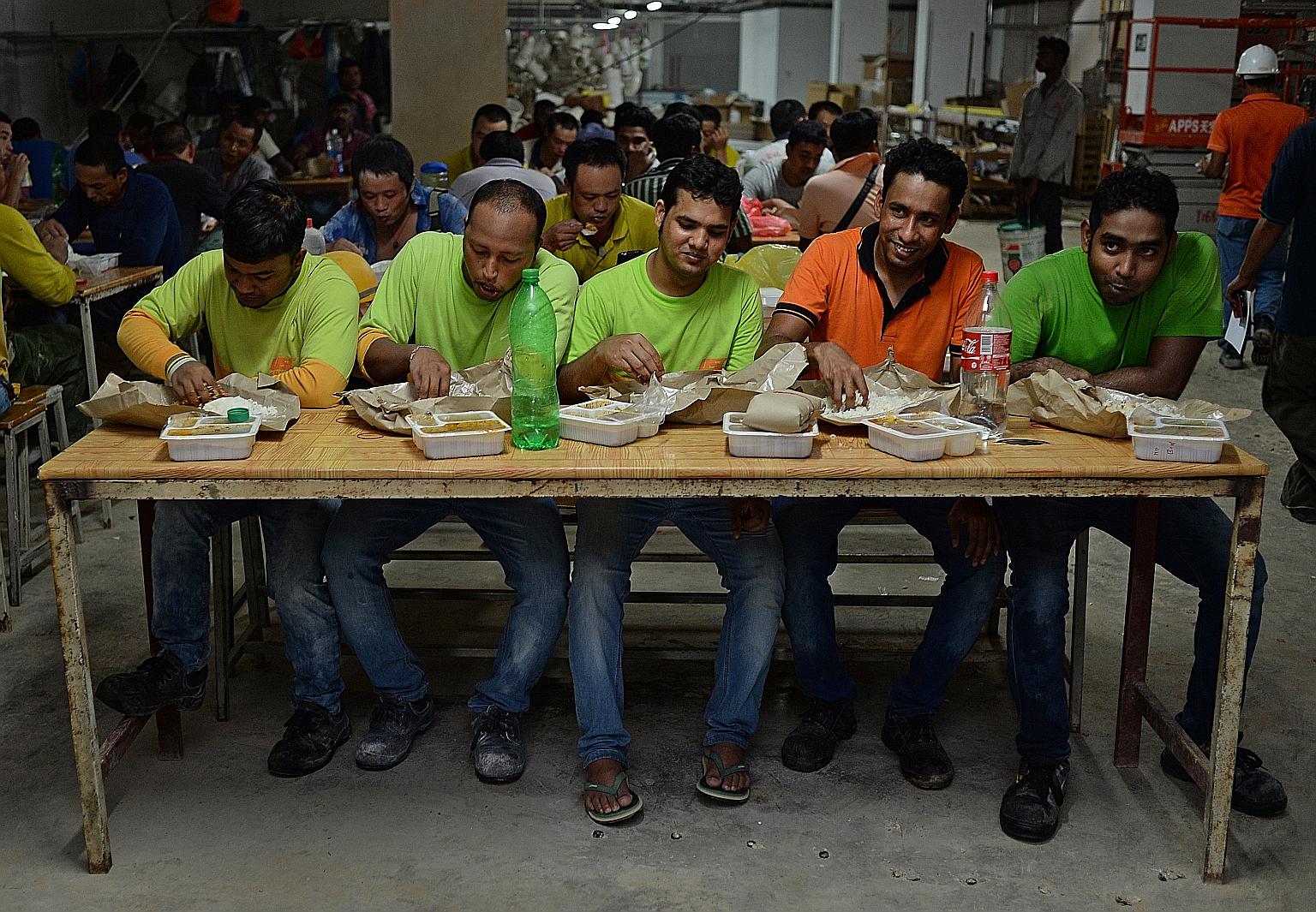Fortified rice to boost workers' nutrition
Social outfit working with contractors, Dutch firm to supply low-cost nutritional meal plans
Sign up now: Get ST's newsletters delivered to your inbox

Workers from Unison Construction having their lunch at their worksite on Wednesday. Unison is one of three firms participating in a pilot programme run by social enterprise 45Rice that ensures hot meals are delivered to foreign workers thrice a day. A fourth contractor will come on board next month.
ST PHOTO: JOYCE FANG
Foreign worker Kandasamy Palanivel, 34, has had a first taste of what is to come, and he likes it. "It looks and tastes like normal rice - just better," said the Indian national who works for Unison Construction.
He is describing a new fortified rice that will soon become a big part of his diet, as well as those of fellow construction workers.
His employer is working with social enterprise 45Rice on this new meal plan, which has already attracted the interest of 15 contractors even before the rice has been produced on a full scale.
The fortified rice provides half the daily nutritional needs - based on the World Health Organisation's recommendation - of an average construction worker. One serving has the same nutritional value as 10 servings of regular rice.
Started last year by World Toilet Organisation founder Jack Sim, 45Rice is the result of a partnership between his other non-profit organisation, Base of Pyramid Hub, and Dutch nutritional supplement manufacturer Royal DSM. Base of Pyramid Hub aims to tackle poverty through business solutions.
Fighting nutrient deficiency
To produce fortified rice grains, minerals and vitamins are blended with rice flour and water at high temperatures (70-110 deg C).
Fortified rice does not differ from regular rice in terms of appearance, taste or texture.
• Micronutrient deficiency, or the lack of vitamins and minerals, affects more than two billion people globally. It is commonly caused by consuming a limited variety of foods.
Symptoms of micronutrient deficiency include fatigue, muscle ache and poor concentration.
Food fortification programmes are increasingly being implemented in developing countries by organisations such as the United Nations World Food Programme.
Sherry Xuerui Sun
45Rice said it will start producing and supplying the fortified rice in the third quarter of this year, after it receives funding from its investors.
In March last year, reports on the poor quality of foreign workers' catered meals, which typically consist of rice and curry, drew ire from netizens.
Workers, who pay for catered meals themselves, will not have to fork out more for the fortified rice, said 45Rice project manager Kevin Moon, 25.
While there is a small difference in cost, it is taken care of after removing the middleman between caterers and contractors.
"While the best way to improve nutrient intake would be to provide more food with higher nutritional values, like vegetables or fruits, this would raise the cost of food significantly," said Mr Moon, adding that the rice is the most cost-effective solution to the problem.
According to WHO, rice fortification has the potential to help aid vulnerable populations with micronutrient deficiencies.
The fortification process does not alter the glycemic index of white rice, or its potential to cause spikes in blood sugar that could increase the risk of diabetes. But the risk of this disease is much lower in physically active construction workers, while the need for a diet containing enough vitamins and minerals is paramount.
Foreign workers are its main consumers, but 45Rice hopes to cater to other low-income groups and, eventually, the rest of Singapore.
"We are also looking to replicate and scale our social enterprise abroad to other countries with high migrant worker populations, like Qatar or the UAE," said Mr Moon.
In the meantime, it has teamed up with three contractors in a pilot scheme that ensures hot meals are delivered to foreign workers thrice a day. This frequency allows the food to be fresh.
A fourth contractor will come on board next month.
"While it definitely involves logistical challenges... we believe worker welfare is important," said Ms Cenci Lim, 50, the human resource manager of Unison Construction, the first contractor to participate in the programme since last November.
Indian construction worker Kandan Kalyanasundaram, 29, said he now looks forward to meal times, unlike before.
"Last time, the rice was hard... But our food now is very nice, and the packaging does not leak," he said. "My friends from other firms now ask me, 'Where did you get the food from? Is there a party?' "
Note: The story was edited on May 13 for clarity.


